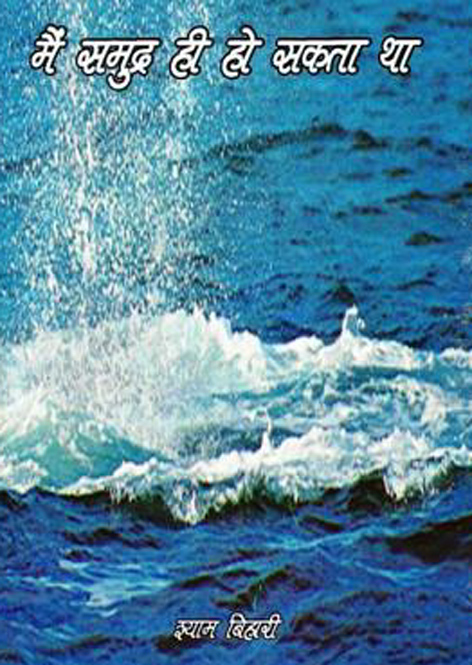Adarsh Ajit
Sham Behari’s award winning book of poetry main samudar hi ho sakta tha is an endeavour to be away , to some extent, from the established and universally accepted way of balancing the two extremes of life, the protest against any kind of repression and the kinship of man in the ocean of love. Sham is ruthless in depicting protest on one side and on the other side he is awfully gushy in the bond of love.
He portrays persons, so fed up with the systems of the country, that they try to disown country’s flag alleging that the wheel of the flag is their assassin slicing them in the name of ‘peace and development’ in installments. After the outburst they suddenly feel that despite all odds they are bound to pay obeisance to it:
hai
kapday kay is tukday kay liyay
kattay thay laakhon
aur chupkay say pooch laita hai
kya vey paagal thay (Heads were cut off for this piece of cloth ….Were they all mad?)
The poet tries to recollect the chronological follies that lead us nowhere except destruction. He suspects that some outside powers intrude in our policies. In a veiled attack, the poet is all critical of the management of Kashmir which is now giving thumps in one way or the other:
aksar meray daanton mein
fans jaata hai koi daanaa
na chabta hai, na nikalta hai
jaisay…veerapan
jaiay… kabuli jahaaz
jaisay kashmir
meray monh main yeh daant kiskay hain (A particle gets entangled in my teeth, neither it is crushed nor it comes out like Veerapan…Kashmir. Whose teeth are in my mouth?”
The philosophy of ‘Truth’ does not lure the poet now. We are duped in the name of ‘Truth’. The poet’s dreams stand devastated. The founding slogan of ‘being truthful’ have proved counterproductive. The poet is distressed with the habit of telling truth all along his life. Ironically he is compelled to unfold the last and the maiden lie of his life and that is “satyam eva jayatay”.
The stabs of intimidation have sucked out the blood from the innocents. Terminating of humanity and co-existence from the hearts of extremists prompts Shyam Behari to declare terrorists as the emotionless lot and the messengers of death:
tum kya jaano
rishton ki garmi
dharti ka dard
pathar tum lahoo sard
naar-e- qatali aam
tum kya jaano
budh…baamiyaan
tumhari jaanib to
baarood khuda hai taaboot hai swarg
tabaahi!
allah meharbaan (How you know the warmth of relations and the pain of the earth? O, coldblooded, your slogan is ‘death’. How you know Budh Baamiyaan? Gunpowder is your God and coffin is your heaven).
The poet is also annoyed with the fast growing ecological imbalances where one can not have a fresh breath. Towering chimneys of the factories and the smoke of the vehicles have snatched the melody of the nature. In the name of progress, we are losing nature:
prashan meraa nahein
prathvi ka hai
uski gatee mein
jo geet thay jeevan kay
shaur mein badal chukay hein(It is not my but the question of the earth. In its speed were the hidden song of life but now it is the entire noise).
Major portion of the book main samudar hi ho sakta tha revolves round the concept of universal love. The poet challenges the lotus that his existence is due to the marshy land and refers himself to it. Sometimes, he symbolizes his beloved with the pen and himself with a page of paper, on which the pen does not stop. At an occasion the poet represents his beloved as a Kaali, wearing garland of skulls, and who ran over Shiva.
In the present era we are going through that period where the concept of true love has, in aggregate, received the blows in the hands of the philosophies of individualism and materialism. Walls are being erected between religion and religion, country and country, man and man, community and community. Shyam Behari like other poets kindles the hope of renaissance of love. He alleges that religious frenzy is responsible for the erosion of love. He aspires to love a child on the condition that he keeps no religion.
While going through the book it looks that the poet is continually overwhelmed with the natural beauty, in whatever context. The poet is intensely in love with mountains. He claims that the mountains and the poetry are the two indispensable constituents for man’s subsistence. He has tried to balance his wrath with the series of poems on love but his ‘love’ and ‘anger’ keep on their concentration.
jee karta hai
udd aon…tum tak. ek chumban loon tumhaara gehra …bohat gehra…bheench loon tumhain………..(Heart aspires to fly to you and take a long kiss and hold you to the extent…)
Sham Bihari through his book main samudar hi ho sakta tha aspires for utrpain state of life where one is peaceful within and everybody emits the fragrance of love. His heart breaks on finding the delinked humanism, lack of virtues, ungratefulness, wickedness, deceit and avarice. Always, between closing and opening of his eyelids he searches for his beloved:
palak khulti hai
palak girtri hai
drishyon ki parton mein
kahaan hai tu(Where are you? I am ever in search of you, my love)
Trending Now
E-Paper


